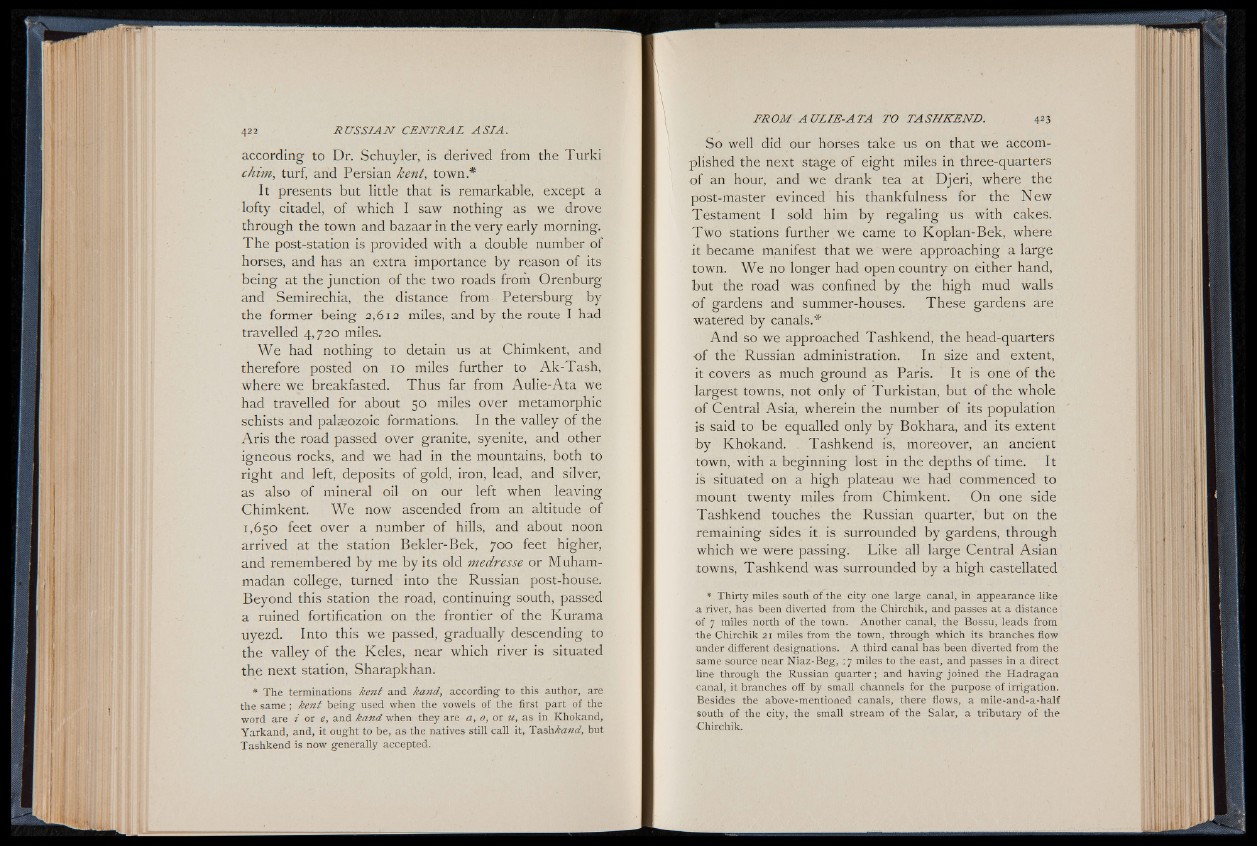
according to Dr. Schuyler, is derived from the Turki
chim, turf, arid Persian kent, town*
It presents but little that is remarkable, except a
lofty citadel, of which I saw nothing as we drove
through the town and bazaar in the very early morning.
The post-station is provided with a double number of
horses, and has an extra importance by reason of its
being at the junction of the two roads from Orenburg
and Semirechia, the distance from Petersburg by
the former being 2,612 miles, and by the route I had
travelled 4,720 miles.
We had nothing to detain us at Chimkent, and
therefore posted on 10 miles further to Ak-Tash,
where we breakfasted. Thus far from Aulie-Ata we
had travelled for about 50 miles over metamorphic
schists and palaeozoic formations. In the valley of the
Aris the road passed over granite, syenite, and other
igneous rocks, and we had in the mountains, both to
right and left, deposits of gold, iron, lead, and silver,
as also of mineral oil on our left when leaving
Chimkent. We now ascended from an altitude of
1,650 feet over a number of hills, and about noon
arrived at the station Bekler-Bek, 700 feet higher,
and remembered by me by its old medresse or Muhammadan
college, turned into the Russian post-house.
Beyond this station the road, continuing south, passed
a ruined fortification on the frontier of the Kurama
uyezd. Into this we passed, gradually descending to
the valley of the Keles, near which river is situated
the next station, Sharapkhan.
* The terminations kent and kand, according to this author, are
the sam e ; kent being used when the vowels of the first part of the
word are i or e, and kand when they are a, o, or u, as in Khokand,
Yarkand, and, it ought to be, as the natives still call it, Tashkand, but
Tashkend is now generally accepted.
So well did our horses take us on that we accomplished
the next stage of eight miles in three-quarters
of an hour, and we drank tea at Djeri, where the
post-master evinced his thankfulness for the New
Testament I sold him by regaling us with cakes.
Two stations further we came to Koplan-Bek, where
it became manifest that we were approaching a large
town. We no longer had open country on either hand,
but the road was confined by the high mud walls
o f gardens and summer-houses. These gardens are
watered by canals.*
And so we approached Tashkend, the head-quarters
o f the Russian administration. In size and extent,
it covers as much ground as Paris. It is one of the
largest towns, not only of Turkistan, but of the whole
of Central Asia, wherein the number of its population
is said to be equalled only by Bokhara, and its extent
by Khokand. Tashkend is, moreover, an ancient
town, with a beginning lost in the depths of time. It
is situated on a high plateau we had commenced to
mount twenty miles from Chimkent. On one side
Tashkend touches the Russian quarter, but on the
remaining sides it is surrounded by gardens, through
which we were passing. Like all large Central Asian
towns, Tashkend was surrounded by a high castellated
* Thirty miles south of the city one large canal, in appearance like
a river, has been diverted from the Chirchik, and passes at a distance
of 7 miles north of the town. Another canal, the Bossu, leads from
the Chirchik 21 miles from the town, through which its branches flow
under different designations. A third canal has been diverted from the
same source near Niaz-Beg, : 7 miles to the east, and passes in a direct
line through the Russian quarter; and having joined the Hadragan
canal, it branches off by small channels for the purpose of irrigation.
Besides the above-mentioned canals, there flows, a mile-and-a-half
south of the city, the small stream o f the Salar, a tributary of the
Chirchik.